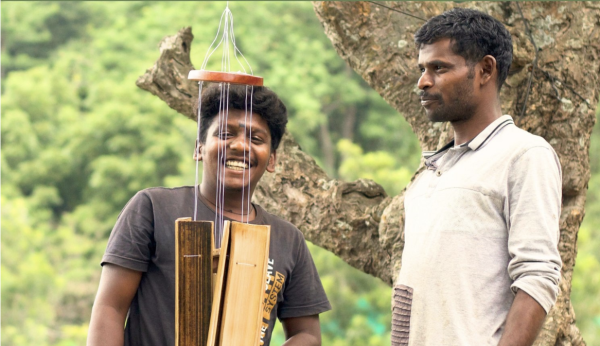Visiting Jazz Pianist and Composer Blurs Musical Categories
Last week, the Conservatory’s Performance & Improvisation program hosted Venezuelan-born jazz pianist and composer Luis Perdomo in a residency which brought his original compositions to the student-led PI ensembles as part of the Conservatory’s Artist Recital Series. The residency culminated in a performance Saturday night which featured six of Perdomo’s compositions performed by the student ensembles, alongside a solo set of his own.
Perdomo looks to salsa and other Latin American styles of music, as well as classical music, as sources of inspiration for his original compositions.
The New York-based jazz pianist has collaborated and performed with contemporary innovators like saxophonists Miguel Zenón, Ravi Coltrane, David Sánchez, and trumpeter Pete Rodriguez.
He collaborated with Zenón on the saxophonist’s 2014 record Identities are Changeable, an homage to the musical identity of diasporic Puerto Ricans. He also assisted with Rodriguez’s 2015 album El Conde Negro, arranging the classic 1979 salsa hit “Soy La Ley” by Rodriguez’s father, the legendary salsa singer Pete “El Conde” Rodriguez.
“What I am trying to adapt from [songs in the salsa tradition] is their essence and core identities, but placed in a jazz context,” Perdomo said. “I want to work with jazz musicians who understand and have a connection with Latin American music and who can also play this music in a way which could be appreciated and understood by those who are familiar with its origins.”
During Perdomo’s residency at Oberlin last week he taught lessons and coached rehearsals for PI students, who are comprised of both Classical and Jazz Performance majors. Students in the PI program form ensembles which perform music introduced by guest artists, such as Perdomo, while receiving instruction from the artists themselves. The PI program is led by Conservatory Professor of Advanced Improvisation and Percussion Jamey Haddad and Associate Professor of Jazz Studies Jay Ashby. Haddad and Ashby have each known Perdomo for a number of years and have previously collaborated with him in New York.
“The guy is authentic in the sense that he understands Venezuelan music at its core, but he’s also a great jazz player who really understands the lineage of the music,” Haddad said. “Most importantly, he empowered the students; he really hit it out of the park with the compositions he brought in because it allowed both classical and jazz students to bring their unique skill sets to the music.”
Compositions performed at Perdomo’s PI concert contain a deep wistfulness and lyricism which hint at an openness and adaptability to style or interpretation. Perdomo’s music is characterized by his rare affinity for transcending musical categories. During the performance at the Cat in the Cream on Saturday, Perdomo lauded the progressive attitude of the PI program.
“It’s really great to see this community between classical and jazz musicians [arise out of the PI program] because for most of my career, I’ve strived to make music beyond borders,” Perdomo said before launching into a playful solo piano piece which highlighted his diverse musical influences. “It’s cool to see classical musicians improvise and jazz musicians placed in situations where they have to read a lot of music, but I think this concept can go even further: jazz musicians playing salsa, and African musicians playing classical music — it’s just great to enjoy music without borders.” Perdomo continued his set, which featured a duet with Ashby on trombone, as well as a trio rendition of a jazz standard with Haddad on drums and Conservatory junior Dan Finn on bass.
Perdomo’s artistic direction also helps usher in a greater presence of underrepresented musical traditions in the Conservatory. Second-year Vocal Jazz Performance major Nicole Odreman, who is also of Venezuelan heritage, performed two of Perdomo’s pieces during the concert. Odreman reflected on the lack of a tangible presence of Latin American music in the Conservatory and how representation matters in these musical spaces.
“I think Latin American music could definitely be more celebrated and explored in the [Conservatory],” Odreman said. “It would be nice to have more vehicles to study and talk about this music, and it’s really refreshing when PI artists like Luis come through because I get to work with someone who is of my culture and who doesn’t separate it from jazz and classical, but integrates it in what we study.”
Luis Perdomo brings a fresh perspective to blurring lines between musical traditions while empowering students to collaborate beyond institutional categories. His work with the PI program illustrates the importance of community-building across musical spaces within Oberlin and should serve as inspiration for students interested in redefining musical borders.










